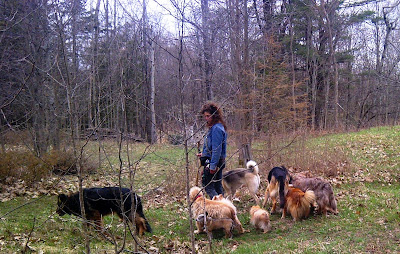Is It Possible that Training Our Dogs Is Really Wrong?
On one of the
professional dog training and behaviour forums that I belong to, (today) one of the
trainers posed the question ‘Is It Possible that Training Our Dogs Is Really
Wrong?’ She then went on to note…'In recent years after having tried the training with rewards, hanging my
dog when aggressive, electric collars, alpha rolls....tried it all. Could there
be something else ...another way to approach working with dogs? What if PR is
really Negative Reinforcement?' Well I have not used e-collars, etc. but my answer to her question (and I think you might find it very interesting) was as follows...
YES! Training our Dogs is Wrong!
 |
| My dogs Robbie and Sarah waiting for permission to start their off-leash portion of the walk |
And now you are thinking "What!? Karen are you crazy, you make your living training dogs!"
Well...hmm, actually I make my living working with dogs and training their people.
Dogs require clear communication – it is the human that requires the training!
So Is it possible that training our dogs is really wrong?
The following was my response to that seemingly odd but intriguing question...
Its Not The Dog That Requires Training
If we are talking
about day-to-day life skills living in a home and community with humans, other
dogs and other animals. If that is the scenario you are referring to then it is
my belief that it is the humans that require training.
If on the other
hand you are referring to situations where the dog will be working on a
specific task such as bomb sniffing, search and rescue, supporting a person that
is physically or mentally challenged then yes the dog will need training
specific to that specialized task. My comments below do not refer to this type
of specialized training, but instead to the type of requirement I noted in my
first paragraph.
A glimpse into my
way of working with dogs and their people...and why looking to train your dog is the wrong approach for those dog owners wanting to provide their dog with the life skills required to be happy well adjusted dogs for normal day-to-day life...
I do not seek to
train the dog, but instead I look to see and understand the dog and then mentor
the dog based on its individual inherited and acquired traits. I communicate
with the dog in a logical and respectful manner, coaching and mentoring that
dog through various situations - while I train its humans to be more
insightful, more aware, more self-disciplined communicators.
In order to train
the human I must also see and understand the human.
I do not believe
it is necessary to train a dog, it is simply necessary to communicate to that
dog in a respectful, logical, insightful manner. It is the human that must be
trained. A brief but more detailed explanation of how that works can be gleaned
from these two articles – here
and here.
So What Should You Do Instead of Training Your Dog?
Well as I see it, you should learn to be more like a dog! Or as Edward Hogland once said...
"In order to really enjoy a dog, one doesn't merely try to train him to be semi-human. The point of it is to open oneself to the possibility of becoming partly a dog."
"In order to really enjoy a dog, one doesn't merely try to train him to be semi-human. The point of it is to open oneself to the possibility of becoming partly a dog."
 |
| That's my boy Robbie and yes, he is smiling and he is asking '"Ok mom, what are we 'gonna do now?" |
In the discussion thread, another trainer
noted that he believes our dogs are very in-tune to our emotions. Well not only
do I believe this to be true, it is also a foundational concept of how I work
with dogs and their people.
Dogs have a full range of emotions and as such they
do understand emotion - they also understand facial expression.
Dogs are one of
the few animals that have a similar muscular facial structure to humans – I can
see all of the expressions on a dog’s face that a human can see on another
human’s face. Understanding how to really read your dog’s face is just one of
the keys to understanding your dog which is why it is something that I teach my
clients. You can have a glimpse into the world of a dog’s facial expression here.
When your wife or girlfriend asks you to follow her to a display in a store - do you oblige? Did she train you or are you acquiescing becasue you want to? Ya, I know you are going to say she trained you (grin) but how do you learn to come when your mother calls you when you are little?
How does a mother dog get her puppies to follow - is it training or is it communication delivered with nuances that make you want to cooperate? Or is it a combination of many things including respect for each other?
The same trainer then came back and asked me "I do have one question Karen. Are you saying you don't teach dog some like even...come?" My answer was of course I teach a dog to come :>) but is that training or is
it just good communication? And how is that dog compelled to come?
Because the dog wants to work with you and you have - in the past given
the dog a truly logical reason to come, or becasue it must listen
becasue we are the human :>)
When your wife or girlfriend asks you to follow her to a display in a store - do you oblige? Did she train you or are you acquiescing becasue you want to? Ya, I know you are going to say she trained you (grin) but how do you learn to come when your mother calls you when you are little?
How does a mother dog get her puppies to follow - is it training or is it communication delivered with nuances that make you want to cooperate? Or is it a combination of many things including respect for each other?
A few trainers on
the forum have had the lack of perspective in the past to say that what I do
is 'voodoo' and 'wooo'. My response to them has always been to say how sad and how
ridiculous, as their shallow comments come from a place of their own insecurity
as it takes great self discipline, self awareness, self restraint and self
control to work as I do. I have to be that thing first, that I would like the dog (and the people) I am working with to be - I have to lead by exacting example.
What I do is
based on a great sense of humility which allows me to see just how amazing, how
intelligent dogs truly are, and how humans have much to learn from dogs. I have learned from dogs and do so every time I
work with a new dog. I do not have the inhibitor that says I am better than a
dog, so a dog has nothing new to teach me. Should the human be truly
intelligent they can liberate themselves from the constraint that a dog is just
a dog.
What I do is based on pure logic which is not
clouded by pre-conceived human concepts and resulting restraints driven by the
notion that only a human may possess great intelligence. I have to have the courage to look beyond what our society, our culture teaches us from the time we are young.
Human intelligence is so often rendered less
than it could be due to the emotional and judgmental nature of our species
:>)
A dog does not have to do as I say simply because
I am a human and the dog is just a dog. I have to earn that dogs trust and
respect.
When we allow ourselves to look beyond, it
allows us to work more with what we have in ourselves so that we can rely less
on man-made devices which simply cannot solve the root cause of our dog's problem - which is really our problem first as our dogs simply follow our lead. Having had the opportunity to work with many dogs and their people I know that a dog in distress is a gift to the human as that dog is there to teach the human how to overcome a personal constraint which they (the human) has never been able to grow beyond. The dog is a gift - the key is to help the human see what their dog is trying to teach them, and at the same time make sure that the experience is one of mutual benefit and growth.
What type of devices am I referring too? Well, for example..
E-collars, prong collars, ‘Easy-Walkers’, the ‘Halti’ and ‘Gentle leader’ etc. The ‘Easy-Walker’, ‘Halti’ and ‘Gentle leader’ can be no more gentle than a prong or e-collar. And yes, with that statement I am really going to tick some trainers and people off...but hey, reality is when I go to work with my clients I ask them, "so how would you feel if someone was digging into your shoulder joint, yanking your head sideways", uh huh - and then I show them how to work without those devices...to resolve the real issue, poor communication.
I am never dismissive of the devices that my clients have used in the past but instead seek to offer them another perspective and a chance to move forward with better options. After all that is my job! When we set out for 'The Walk' I say please bring the tools that you are comfortable with (prong collar, easy walker, extensible leash, gentle leader, etc.)...but put it in your pocket (prong collar ouch :>). Then I say "bring it with and we will try my way first, if you feel uncomfortable, if I cant find a way to make this work for you, we will use your device" The device never gets used again. Why? Because the human learns to communicate properly with their dog!
- Despite the claims and advertising tactics of the manufacturer these devices
- Are not in many cases ergonomically healthy for the dog;
- The gentle walker works as a restraint as it digs into the soft tissue, muscle, ligaments and tendons of a dog’s shoulder joint;
- The Halti or Gentle Leader puts pressure on the dog’s nose and neck and often on the dog’s eye sockets as well;
- These devices simply allow the human to invasively, physically control the dog;
- These devices do not solve the root cause of why it is necessary for the human to use the device;
- These devices do not teach a human how to understand their dog better;
- These devices do not teach the human how to become a better communicator;
- And the same can be said for the use of treats.
Now before you get angry and hot under the collar...oops its too late for that...but wait...
Granted some of you might be thinking "this is just arrogant".
Nope, I'm not, what I am doing is driving home the point that the human needs to be trained...
Granted some of you might be thinking "this is just arrogant".
Nope, I'm not, what I am doing is driving home the point that the human needs to be trained...
Are there ever applications when these devices do have a place?
Yes of course.
For instance, if a dog must quickly acquire an understanding of how to cope with a situation i.e. how to behave in a safe manner around industrial or farm equipment. When used properly an e-collar can be a positive aid. But this type of situation is very specialized and really does not fit into the parameters faced by the typical dog owner.
While many dog
owners find themselves using these various devices, it is fair to say that they
have little choice but to do so, if the trainer that they engaged to assist
them had only a limited knowledge from with to work.
In my opinion...
It is far better
for a dog to be subject to the use of one of these devices than for the
dog to be euthanized because the owner had no control over the dog...
But...
It is one-thousand fold better for the
root cause that drives the need for such devices to be solved rather than masked;
And that requires that the human be trained.
When we as a species, and as individuals allow ourselves to openly and truly see what is possible, and what is truly before
our eyes and what in reality presents to our other senses;
We are empowered to work as a dog does.
This then allows us to be
more like a dog - a being that is a truly an amazing communicator.
 | ||
| Yeap, Robbie and Sarah smiling again and asking again - this time their question was "can you pick an apple from the tree for us?" Which of course I did do, after all dogs are omnivores :>) |
The following is an example I often use with my clients - the example explains how we have the opportunity to engage a dog to work with us or instead we can create a situation in which we force a dog to not want to work with us. It is all about patience and communication …
Let’s say you were at work and something went wrong…
Your boss says to you "YOU really messed that up" – he/she does not speak with any kindness or openness but instead with pure anger, ire, aggression. Are you going to want to work with your boss? Or are you thinking he is a jerk (to put it mildly).
Now let’s look at what happens if your boss reacts in a different manner…
Your boss says to you "that did not go so well, but hey - look, this is what WE are going to do instead" – he/she speaks with an open and positive energy that draws you in, compels you to be happy to work with him/her.
Your bosses’ approach, his energy and emotions have the power to either repel you or engage you – and so it is for a human when working with a dog. The instant you think ‘bad’ dog’ you have just fed your body language with your thoughts (your mind and your body) and closed your heart (your emotions, your spirit). Your dog reads all of this instantaneously – combine this with your tension and you have consistency and leadership…but not the kind you want! Here is an article that takes this theory into practice – I recommend reading it.
Pure logic, not based on training the dog, but instead based on training the human.
Holistic Diet, Nutrition, Wellness Services Tailored to Your Individual Dog and Cat
For information about my holistic diet, nutrition, wellness services visit my:
Maintain good health | Address acute and chronic health issues | Pre and post surgery support and recovery
My holistic wellness services are available worldwide via video consultation.
🌎 USA | Canada | UK | Europe | Australia | New Zealand | Asia | South and Central America | Africa | UAE
📱 FaceTime | Facebook | Skype | WhatsApp
Holistic Behavioral Services For Your Dog
For information about my holistic behavioral services visit my:
For dogs of all ages, sizes and breeds
My holistic behavioral services are available locally in-person and worldwide via video session.
🌎 USA | Canada | UK | Europe | Australia | New Zealand | Asia | South and Central America | Africa | UAE
📱 FaceTime | Facebook | Skype | WhatsApp
Affiliations to Companies
✓ None.
✓ I don't sell food or supplements.
✓ I'm not aligned with any companies.
✓ None.
✓ I don't sell food or supplements.
✓ I'm not aligned with any companies.
Article and graphics by Karen Rosenfeld











